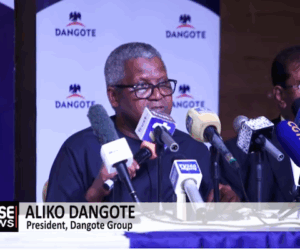Nigeria’s foreign exchange reserves have risen to $41.00 billion as of August 19, 2025, the highest level in 44 months, according to the Central Bank of Nigeria (CBN).
“The current level marks the highest level recorded since December 3, 2021, and shows the steady external accretion witnessed in recent weeks,” the CBN said in a statement published on its website.
The apex bank noted that the new trajectory followed “months of gradual depletion and volatility, largely attributed to intense pressure from external debt repayments.”
Providing details of the trend, the CBN explained that reserves “have staged a strong rally in August, adding about $1.46 billion month-to-date, from $39.54 billion on 1 August to $41.00 billion by 19 August. This represents a 3.69% growth in less than three weeks. The momentum has been broadly consistent across trading days, with only marginal pauses.”
According to the bank, “the build-up began in earnest from early August, when reserves crossed the $40 billion threshold on 7 August, after closing July below $39.4 billion. From there, the pace of accretion quickened: reserves advanced to $40.5 billion by 12 August and crossed $41 billion just a week later. On average, the country’s reserves have grown by roughly $81 million per day in August, reflecting improved FX inflows relative to outflows.”
The CBN stressed that “this sharp climb underpins the Bank’s ability to stabilise the naira in the official market, manage liquidity, and defend against speculative pressure.”
On the year-to-date performance, the bank recalled that “Nigeria’s reserves opened the year at $40.88 billion on 31 December 2024. At the latest print of $41.00 billion, this translates to an increase of about $124 million or 0.30%. In other words, most of the 2025 gains have been concentrated in the past five weeks, following a relatively subdued first half of the year.”
It added that “between January and June, reserves largely fluctuated within the $37 billion to $39 billion range, reflecting FX market interventions, oil price swings, and debt service obligations. For instance, reserves dipped to $37.28 billion in early July before the recent rebound. The sharp turnaround since mid-July has therefore added over $3 billion, a growth of about 8% within just a month.”
From a longer-term perspective, the Bank declared that “the $41 billion recorded puts Nigeria in its strongest external reserve position since late 2021. The recent improvement is significant given the prolonged drawdowns that followed through 2022 and 2023, when reserves struggled to hold above $38 billion.”
Highlighting the importance of the reserves build-up, the CBN stated: “A stronger reserve base is a critical pillar for currency market confidence. It improves Nigeria’s sovereign credit outlook, reassures investors of the government’s ability to meet external obligations, and strengthens the Bank’s capacity to manage liquidity shocks. Importantly, the symbolic return to the $41 billion level signals improved FX inflows, possibly from crude oil earnings or portfolio flows.”
Earlier, the CBN had also reported “sustained stability in the foreign exchange market, citing increased capital inflows, improved crude oil production, rising non-oil exports, and reduced imports.”
Looking ahead, the bank cautioned that “sustaining this momentum will depend on a delicate balance of oil exports, non-oil FX receipts, debt servicing, and policy direction. For now, however, the sharp August build-up places Nigeria on firmer footing, with the reserves at their highest point in nearly four years.”
Boluwatife Enome
Follow us on:








